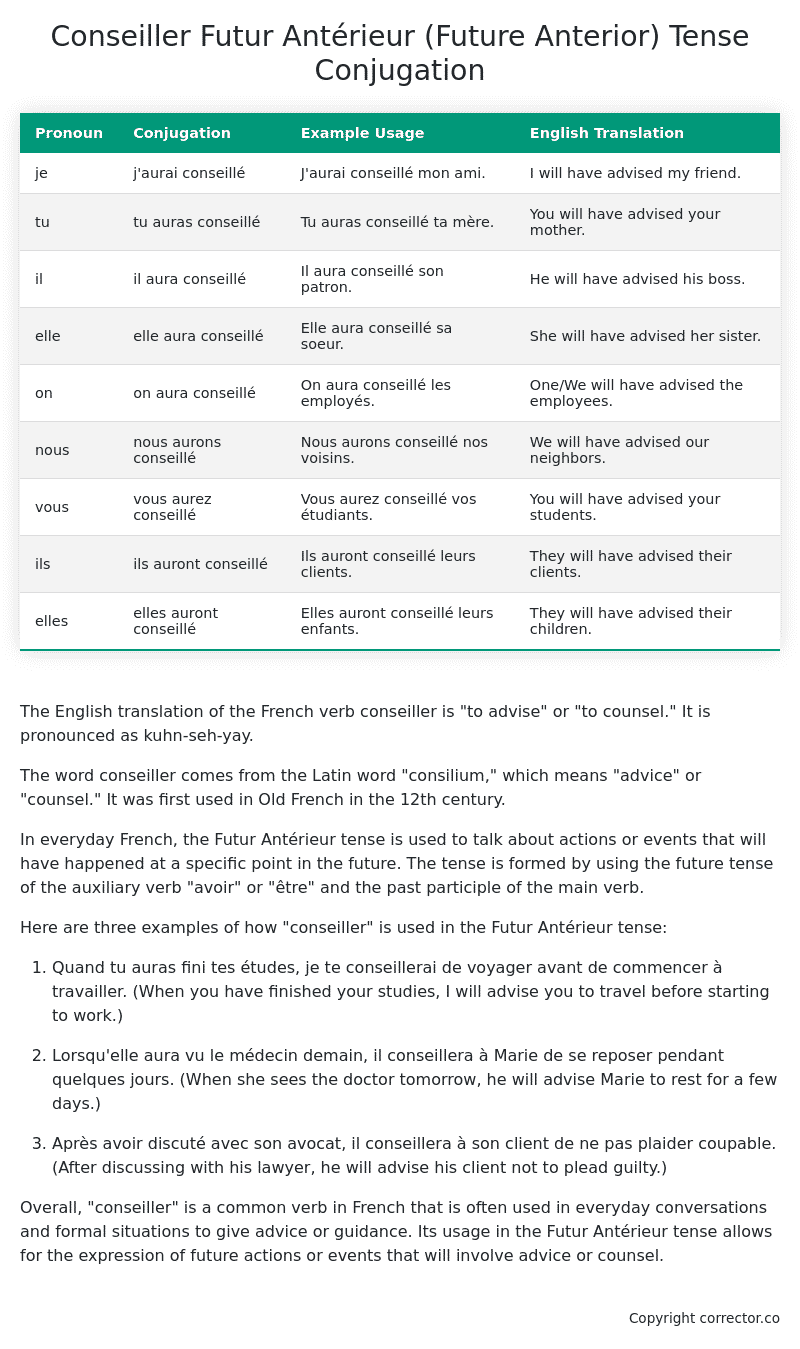Futur Antérieur (Future Anterior) Tense Conjugation of the French Verb conseiller
Introduction to the verb conseiller
The English translation of the French verb conseiller is “to advise” or “to counsel.” It is pronounced as kuhn-seh-yay.
The word conseiller comes from the Latin word “consilium,” which means “advice” or “counsel.” It was first used in Old French in the 12th century.
In everyday French, the Futur Antérieur tense is used to talk about actions or events that will have happened at a specific point in the future. The tense is formed by using the future tense of the auxiliary verb “avoir” or “être” and the past participle of the main verb.
Here are three examples of how “conseiller” is used in the Futur Antérieur tense:
-
Quand tu auras fini tes études, je te conseillerai de voyager avant de commencer à travailler. (When you have finished your studies, I will advise you to travel before starting to work.)
-
Lorsqu’elle aura vu le médecin demain, il conseillera à Marie de se reposer pendant quelques jours. (When she sees the doctor tomorrow, he will advise Marie to rest for a few days.)
-
Après avoir discuté avec son avocat, il conseillera à son client de ne pas plaider coupable. (After discussing with his lawyer, he will advise his client not to plead guilty.)
Overall, “conseiller” is a common verb in French that is often used in everyday conversations and formal situations to give advice or guidance. Its usage in the Futur Antérieur tense allows for the expression of future actions or events that will involve advice or counsel.
Table of the Futur Antérieur (Future Anterior) Tense Conjugation of conseiller
| Pronoun | Conjugation | Example Usage | English Translation |
|---|---|---|---|
| je | j’aurai conseillé | J’aurai conseillé mon ami. | I will have advised my friend. |
| tu | tu auras conseillé | Tu auras conseillé ta mère. | You will have advised your mother. |
| il | il aura conseillé | Il aura conseillé son patron. | He will have advised his boss. |
| elle | elle aura conseillé | Elle aura conseillé sa soeur. | She will have advised her sister. |
| on | on aura conseillé | On aura conseillé les employés. | One/We will have advised the employees. |
| nous | nous aurons conseillé | Nous aurons conseillé nos voisins. | We will have advised our neighbors. |
| vous | vous aurez conseillé | Vous aurez conseillé vos étudiants. | You will have advised your students. |
| ils | ils auront conseillé | Ils auront conseillé leurs clients. | They will have advised their clients. |
| elles | elles auront conseillé | Elles auront conseillé leurs enfants. | They will have advised their children. |
Other Conjugations for Conseiller.
Le Present (Present Tense) Conjugation of the French Verb conseiller
Imparfait (Imperfect) Tense Conjugation of the French Verb conseiller
Passé Simple (Simple Past) Tense Conjugation of the French Verb conseiller
Passé Composé (Present Perfect) Tense Conjugation of the French Verb conseiller
Futur Simple (Simple Future) Tense Conjugation of the French Verb conseiller
Futur Proche (Near Future) Tense Conjugation of the French Verb conseiller
Plus-que-parfait (Pluperfect) Tense Conjugation of the French Verb conseiller
Passé Antérieur (Past Anterior) Tense Conjugation of the French Verb conseiller
Futur Antérieur (Future Anterior) Tense Conjugation of the French Verb conseiller (this article)
Subjonctif Présent (Subjunctive Present) Tense Conjugation of the French Verb conseiller
Subjonctif Passé (Subjunctive Past) Tense Conjugation of the French Verb conseiller
Subjonctif Imparfait (Subjunctive Imperfect) Tense Conjugation of the French Verb conseiller
Subjonctif Plus-que-parfait (Subjunctive Pluperfect) Tense Conjugation of the French Verb conseiller
Conditionnel Présent (Conditional Present) Tense Conjugation of the French Verb conseiller
Conditionnel Passé (Conditional Past) Tense Conjugation of the French Verb conseiller
L’impératif Présent (Imperative Present) Tense Conjugation of the French Verb conseiller
L’infinitif Présent (Infinitive Present) Tense Conjugation of the French Verb conseiller
Struggling with French verbs or the language in general? Why not use our free French Grammar Checker – no registration required!
Get a FREE Download Study Sheet of this Conjugation 🔥
Simply right click the image below, click “save image” and get your free reference for the conseiller Futur Antérieur tense conjugation!

Conseiller – About the French Futur Antérieur (Future Anterior) Tense
Construction
Common Everyday Usage Patterns
Interactions with Other Tenses
For example
Summary
I hope you enjoyed this article on the verb conseiller. Still in a learning mood? Check out another TOTALLY random French verb conjugation!


